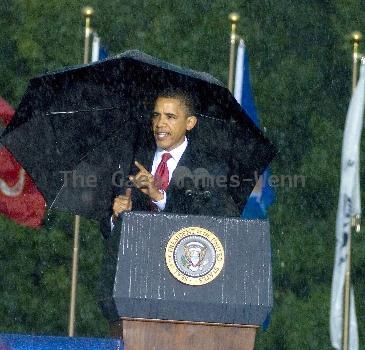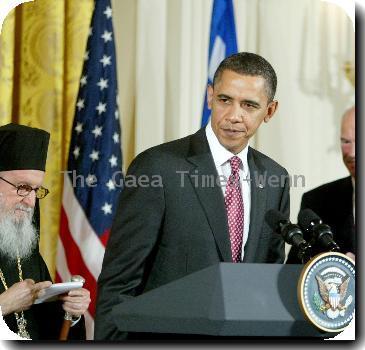Egypt says more work needs to be done to move to direct Israeli-Palestinian peace talks
By APSunday, July 18, 2010
Egypt: basis to move to direct peace talks lacking
CAIRO — Pressure intensified on Palestinian President Mahmoud Abbas to agree to direct talks with Israel as Egypt held separate back-to-back meetings with the two sides Sunday in search of a compromise.
Abbas says he won’t negotiate directly with Israeli Prime Minister Benjamin Netanyahu unless Israel agrees to recognize its 1967 frontier as a basis for the borders of a future Palestinian state and accepts the deployment of an international force to guard them. Netanyahu has refused to be pinned down on a framework for negotiations.
In an effort to sound out the prospects for a move to direct talks, Egyptian President Hosni Mubarak met with Abbas, Netanyahu and U.S. Mideast envoy George Mitchell separately Sunday in Cairo.
Egypt has friendly ties with both Israel and Abbas’ Palestinian Authority, and Cairo — like Washington — is pushing to narrow the divide between the two sides and coax them back to the negotiating table.
None of the leaders — nor the U.S. envoy — spoke after the meetings, but Egypt’s foreign minister, Ahmed Aboul Gheit, told reporters there is still work to be done to get the Palestinians to move to direct talks.
“There must be a strong Israeli strategic move that would deepen Palestinian trust in Israel’s intentions, so we can move from indirect to direct talks,” Aboul Gheit said. “Egypt thinks there is the need for direct talks, that they are the road to reach a settlement … but to have these direct talks, the atmosphere must be ripe and enough progress made.”
Cairo called for a more hands-on U.S. role with the two sides to lay the groundwork for direct negotiations. Aboul Gheit said this could include at least a general framework from Washington for the final settlement.
Egypt’s top diplomat also said there is still more discussion and diplomacy in an effort to narrow the divide and build trust between the two sides.
“We are still hopeful that we can bridge that gap, the gap between the needs of security for Israel and the borders for the Palestinians,” Aboul Gheit said. “You have to create the basis to proceed from indirect to direct talks. That is still lacking. We need to help the Americans and both parties to come closer to each other.”
He said Mubarak received a message Sunday from President Barack Obama and a telephone call from U.S. Secretary of State Hillary Clinton urging a swift move to direct peace talks.
Aboul Gheit said he hoped that by September there would be enough progress to allow the Palestinians and Israel sit at the same negotiating table, if not sooner.
The four months set aside for Mitchell’s shuttle diplomacy and Israel’s partial curb on settlement construction will have come to an end by September.
Israeli defense officials have said that Israel is considering expanding the role of Palestinian security forces in West Bank towns and removing additional checkpoints that hinder the movement of people and goods. The officials spoke on condition of anonymity because no final decision had been made.
When asked about these steps and whether they constitute trust-building, Aboul Gheit said they “address certain problems.”
“But I think we have to focus on (freezing) settlement activity, a timeframe and the 1967 lines,” he said, referring to the borders prior to the 1967 Mideast war.
Abbas is unlikely to enter direct talks without explicit backing from Arab states, whose support he received before engaging in indirect negotiations. Arab foreign ministers are to discuss the fate of those talks later this month.
Netanyahu, who met earlier Sunday with Mitchell in Jerusalem, told Israel’s Cabinet that he would discuss with Mubarak ways to resume direct talks with the Palestinians. The two leaders’ meeting in Cairo lasted nearly two hours.
Netanyahu will also meet late Sunday with EU foreign affairs chief Catherine Ashton upon his return to Jerusalem.
Earlier in the day, Ashton visited the blockaded Gaza Strip to gauge the impact of Israel’s easing of its embargo on the Hamas-ruled territory.
She called on the Israel to go beyond easing its embargo and throw open Gaza’s borders.
“We want to see the opportunity for people to be able to move around freely, to see goods not only coming in to Gaza but exports coming out of Gaza,” Ashton said.
In Jerusalem, Ashton said she discussed the Gaza situation with Israeli Foreign Minister Avigdor Lieberman before meeting Netanyahu. She said the blockade must be lifted, while recognizing that “the security of Israel is extremely important and must be assured.”
Israel continues to ban virtually all exports from Gaza and restricts the import of badly needed construction supplies and raw materials for industry. And along with Egypt, it prevents most Gazans from traveling.
Israel, citing security concerns, has signaled that it is not willing to completely open border crossings.
Associated Press writers Karin Laub and Ibrahim Barzak contributed to this report from Gaza City.
Tags: Africa, Barack Obama, Blockades, Cairo, Egypt, Foreign Aid, Gaza Strip, Hillary Clinton, International Agreements, Israel, Jerusalem, Materials, Middle East, North Africa, North America, Palestinian Territories, Territorial Disputes, United States



